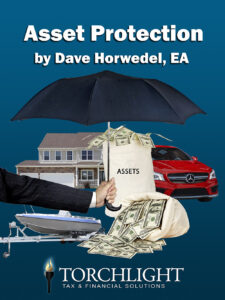By Dave Horwedel, the CEO of Torchlight and GuardDog Tax.
Millions of Americans are worried about protecting their assets, or SHOULD BE. 100 million lawsuits are reportedly filed in America annually. There are only about 132 million households in America. That is almost one lawsuit per household per year.
Consider Donald Trump–a billionaire who successfully avoided income tax on his assets for many years and whose assets are now under legal attack for nearly half a billion dollars.
What happened?
This is NOT a political statement. Whether you are a Democrat who is happy Donald Trump is under legal attack, or a Republican who thinks it is election interference, or somewhere in the middle, is beside the point.
Most Americans, regardless of political affiliation, would like to pay the minimal amount of taxes they legally can and would like to have their assets secure, so long as they do not have to lie or cheat or put themselves at risk.
What made Donald Trump vulnerable in 2024, when he had not been vulnerable in earlier years?
First, he was well-known for being rich, and promoted this. Anonymity is probably the most successful Asset Protection Strategy. He threw this strategy away.
But if you are a Grant Cardone or a Donald Trump, part of your financial success is based on being KNOWN as rich.
Do I think more could have been done to shield his assets? Yes. I am sure of it.
Taxes, litigation, and asset protection strategies are not stagnant.
The environment in which Individuals, LLCs, Corporations, and Trusts operate, changes.
Donald Trump’s asset protection and tax strategies were working up to 2020.This is not a moral or ethical judgement. It is totally factual. His strategies were working because he did not have to pay judgements or put up a bond to prevent seizure of those assets.
In 2024, he gets a $450 million judgement against him. Valuable assets are at risk. Those strategies stopped working.
Donald Trump’s legal and financial advisors either did not see and successfully respond to the legal threat in New York, or did not get Donald to heed their advice.
This is not a Democrat, Libertarian, or Republican thing.
It is of course possible Trump will win in the end. His hands also may have been tied in that actions to protect his assets might have backfired on his political ambitions.
Now, what lessons can you learn from this?
The first lesson is to be alert to legal, court and societal shifts. Tax and asset protection strategies need to be reviewed in response to these changes.
LLCs, Corporations, and Trusts have been at the forefront of tax saving and asset protection strategies. These strategies may need revision as laws, court decisions and politics change.
Let’s look at what happened with Covid-19. Restaurants, small retailers, and live entertainment –and their employees—took huge hits.
If I were an employer or employee in one of these, or many other industries, I would look for an additional business source of income.
In most cases the best entity type would be an LLC, because it gives you the most options. An LLC can choose to be treated for tax purposes as a Sole Proprietorship, Partnership, C Corporation or S Corporation.
Also, LLC ownership can be anonymous in states such as Wyoming, and this is a further advantage. Even if you are operating in another state, and must register there, a Wyoming LLC can be the owner.
If a litigious lawyer cannot see your assets, he is much less likely to sue you!
Land Trusts can be used to buy and sell real estate with minimal paperwork and anonymity as well. They are also essential for investors who purchase real estate at auction, as you can preserve your anonymity and purchase into a land trust and later put the real estate into an LLC or other entity.
If you have a family and home to protect, you should have a living trust. The living trust’s purpose is to protect your estate from having to go through probate. Rather than having your assets go to your family under a probate court’s direction (which can be slow and expensive) you can set up a Trust and name someone you trust as the Trustee.
Living Trusts protect your heirs from probate.
Businesses can purchase equipment or added marketing services or other expenses that will lower their current taxes while building their future income.
In real estate (remember Grant Cardone) investing, cost segregation and accelerated depreciation can save tax dollars now and help you build the value of real estate investments more rapidly. Also, 1031, like-kind commercial real estate exchanges, can defer sales’ profits on real estate sales until death, and then the taxable profits disappear as the assets go to your heirs without being taxed.
Proper uses of entities, LLCs, Partnerships, S Corporations, C Corporations, and Trusts can save tax dollars and protect your assets.
Qualified Opportunity Zones investments can increase your assets, help disadvantaged areas, and lower your tax bill.
An Offer in Compromise can eliminate tax debt that you cannot realistically pay.
Donating cash to charity can lower your tax bill.
Donating assets (stocks, real estate, et cetera) that have gone up in value to charity allows you to avoid taking the taxable profit on the sale as income, and still gives you a charitable contribution that you can deduct. This can be done after death from your estate as well.
Assets that have gone down in value can lower your taxable income on the loss. So do not donate these to a charity. Sell them first.
These are only a few of the many strategies available. All such strategies should be done in coordination with trained professionals, such as CPAs, EAs and Attorneys or you should do your own research.
Contact us for a free consultation at Torchlight or GuardDog Tax at 1-877-758-7797 or email us at info@torchlighttax.com or info@ guarddogtax.com.


